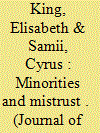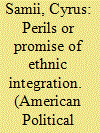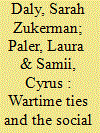|
|
|
Sort Order |
|
|
|
Items / Page
|
|
|
|
|
|
|
| Srl | Item |
| 1 |
ID:
181670


|
|
|
|
|
| Summary/Abstract |
We address a debate over the effects of private versus customary property rights on external investment. Despite political economists’ claims that external investors favor private property rights, other experts argue that customary systems enable large-scale “land grabs.” We organize these competing claims, highlighting trade-offs due to differences in legibility versus the ability to displace existing landholders under both systems. We study a natural experiment in Liberia, where law codifies parallel private and customary property rights systems. We use this institutional boundary and difference-in-differences methods to isolate differential changes in external investment under the different property rights systems following the global food crisis of 2007–08. We find a larger increase in land clearing where private property rights prevailed, with such clearing related to more concession activity. Qualitative study of a palm oil concession reveals challenges external investors confront when navigating customary systems.
|
|
|
|
|
|
|
|
|
|
|
|
|
|
|
|
| 2 |
ID:
159745


|
|
|
|
|
| Summary/Abstract |
An enduring debate in the conflict management literature concerns the wisdom of recognizing versus avoiding reference to ethnic identities in institutions to manage ethnic conflict. Understanding why ethnic recognition occurs is crucial for informing this debate. We develop a theory based on functional and political mobilization effects of recognizing ethnic groups. Contrary to reasoning that minority leaders would be most interested in recognition, the theory suggests that recognition consistently favors the interests of leaders from larger, plurality groups, whereas minority leaders face a ‘dilemma of recognition’ between functional gains and mobilization threats. We use mixed methods to test our theory. For our quantitative analysis, we draw on an original coding of recognition in constitutions and comprehensive political settlements from 1990 to 2012. We find that for cases with leaders from plurality groups, recognition is adopted 60% of the time. With leaders from minority groups, the rate is about 40 percentage points lower, even after accounting for many background factors. Additional quantitative tests and a qualitative analysis present more detailed evidence to show that the processes correspond to the logic of our theory. Answering these questions about when and why recognition is adopted is a crucial step in evaluating its effects on conflict.
|
|
|
|
|
|
|
|
|
|
|
|
|
|
|
|
| 3 |
ID:
178714


|
|
|
|
|
| Summary/Abstract |
Peacekeeping operations are integral to multilateral strategies to help establish stable, self-sustaining peace and development in countries coming out of civil war. While we know, from macro-level empirical studies, that these operations contribute to the durability of peace, the evidence on their effectiveness at the micro level remains scant. Using surveys and administrative data from postwar Liberia, we test the hypothesis that peacekeeping deployments build peace ‘from the bottom up’ through contributions to local security and local economic and social vitality. The hypothesis reflects official thinking about how peacekeeping works via ‘peacebuilding’. We create a quasi-experiment by applying coarsened exact matching to administrative data used in mission planning, identifying sets of communities that were similarly likely to receive bases. We do not find effects on local security measured in terms of physical victimization, fear of victimization, or migration patterns. We find only modest effects on socio-economic vitality. NGOs tend to work in areas where deployments are not present, contrary to the hypothesis. Thus, we are less inclined to believe that peacekeepers build peace from the bottom up, leaving macro-level mechanisms such as signaling and deterrence at the level of leaders as worthy of more attention. In terms of policy, peacekeeping missions should re-evaluate their methods for providing local security.
|
|
|
|
|
|
|
|
|
|
|
|
|
|
|
|
| 4 |
ID:
127816


|
|
|
|
|
| Publication |
2013.
|
| Summary/Abstract |
A central question in the study of political development is how conflict between ethnic groups might be transcended. Findings from social psychology suggest that ethnically integrating institutions such as militaries or representative bodies may remove prejudices and exclusionary behavior that perpetuate interethnic animosity. Political scientists have tended to be skeptical, arguing that such processes may actually intensify or "freeze" conflicting ethnic identities. I use evidence from a hard case-military reform in the aftermath of a brutal, ethnically charged civil war in Burundi-to study this issue. At the macro level, the Burundian military undertook extensive quota-based integration that nonetheless resulted in a cohesive institution. A micro-level natural experiment, which produces quasirandom exposure to ethnic integration through the military retirement age, shows that exposure to ethnic integration decreases prejudicial behavior and is benign with respect to ethnic salience. Together, these results suggest promise in ethnic integration.
|
|
|
|
|
|
|
|
|
|
|
|
|
|
|
|
| 5 |
ID:
121846


|
|
|
|
|
| Publication |
2013.
|
| Summary/Abstract |
Considerable resources are devoted to ex-combatant reintegration programs in current peace processes, but evidence on their effectiveness remains thin. We use original survey data to study an ex-combatant reintegration program implemented after Burundi's 1993-2004 civil war. Previous quantitative studies have found reintegration programs to be ineffective, but only ex-combatants who self-selected into programs were studied. We avoid such selection problems with a quasi-experimental design exploiting an exogenous bureaucratic failure. We find the program resulted in a 20 to 35 percentage point reduction in poverty incidence among ex-combatants and moderate improvement in livelihoods. But this economic boost does not seem to have caused political reintegration: while we find a modest increase in propensities to report civilian life as preferable to combatant life, we find no evidence that the program contributed to either more satisfaction with the peace process or a more positive disposition toward current government institutions.
|
|
|
|
|
|
|
|
|
|
|
|
|
|
|
|
| 6 |
ID:
173210


|
|
|
|
|
| Summary/Abstract |
While ex-combatant reintegration is vital to successful transitions from war to peace, some former fighters turn to crime following demobilization. Such criminality undermines the consolidation of political order. Leading theories of crime participation emphasize the role of both individual economic opportunities and factors related to social ties. Yet, we still know little about the social logic of ex-combatant criminality and how social and economic factors relate as drivers of crime participation. This article presents a theory of how wartime social ties – namely, vertical ties to former commanders and horizontal ties to ex-combatant peers – influence ex-combatant crime on their own and via their relationship to economic opportunity costs. We use the theory to derive predictions in the context of Colombia, and then test them with a combination of administrative data and high-quality original survey data. We find that both vertical and horizontal wartime ties are powerful drivers of ex-combatant criminality. Our evidence indicates that wartime ties mitigate the risks of criminal behavior by facilitating the transmission of criminal capabilities and pro-crime social norms. We do not find that economic conditions moderate the effect of wartime times nor do we find any indication that economic opportunity costs, on their own, predict criminality. These findings underscore the importance of wartime ties – both vertical and horizontal – to understanding post-conflict transitions and designing reintegration interventions.
|
|
|
|
|
|
|
|
|
|
|
|
|
|
|
|
| 7 |
ID:
121799


|
|
|
|
|
| Publication |
2013.
|
| Summary/Abstract |
While transitional justice interventions are common in current post-conflict transitions, recent surveys in such settings suggest that public opinions often vary in their levels of support for such policies. Understanding such opinions is crucial for designing post-conflict policies that properly reflect public interests. This study uses original survey data from Burundi to interpret public opinions toward transitional justice policies in a post-civil war context. The data reveal a great deal of wariness among Burundians toward punishing human rights offenders or seeking the truth about the past. Why would large numbers of those entitled to accountability and truth express a preference to 'forgive and forget'? This question is addressed by focusing on two important features of post-conflict settings - namely (1) uncertainty about the potential for renewed violence and (2) intense competition over how the postwar balance of power should be institutionalized. Findings suggest that the latter feature is indeed crucial: deep partisan motivations associated primarily with ethnicity, and to a lesser extent region, are key determinants of expressed desires to forgive and forget. A reasonable interpretation is that a sense of political gain may compensate for debts owed due to past abuses and induce a preference to avoid the pursuit of truth or punishment lest the political gains somehow be threatened. The conclusion draws out implications for policy and further research.
|
|
|
|
|
|
|
|
|
|
|
|
|
|
|
|
|
|
|
|
|